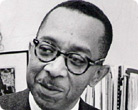Kenneth Clark was a psychologist, educator, and social reformer who dedicated his life to the cause of racial justice. Born in 1914 in the Panama Canal Zone, Clark grew up in Harlem where he attended desegregated public schools. He received his bachelor's and master's degrees at Howard University, where he led demonstrations against segregation in Washington, D.C. At Howard, Clark met fellow psychology student Mamie Phipps, who became his wife and key collaborator. They moved to New York to attend Columbia University, where, in 1940, Clark became the first African American to receive a doctorate in psychology from that institution. Two years later, Clark became the first black permanent professor at City College of New York, where he remained until his retirement in 1975.
Kenneth and Mamie Clark conducted many studies on the effects of racism on child development, finding that segregation was psychologically damaging to both black and white children. In one famous study, they found that black children as young as 3 years old preferred white dolls to black dolls. This study was cited by the U.S. Supreme Court in the landmark 1954 decision Brown v. Board of Education, which declared segregated education unconstitutional. Clark also traveled the country, serving as an expert witness for the NAACP in its legal struggles against segregation in the 1950s.
Clark's many books include Prejudice and Your Child (1955), Dark Ghetto: Dilemmas of Social Power (1965), The Negro American (1966), Crisis in Urban Education (1971), A Possible Reality (1972), and Pathos of Power (1975). He and his wife founded Harlem's Northside Center for Child Development in 1946. The small clinic became a valuable resource as it provided psychological care for emotionally disturbed children, as well as educational support for the community. In the sixties, Clark helped establish the Harlem Youth Opportunities Unlimited, a project that influenced President Lyndon Johnson's War on Poverty program.
Clark became the first African American to join the New York Board of Regents and to serve as president of the American Psychological Association. He and Dr. Mamie Clark, who died in 1983, both contributed in-depth interviews to Columbia's Oral History Research Office in 1976 (Kenneth Clark also gave a short interview in 1997 as part of the War on Poverty oral history project). The couple had a daughter, Kate, and a son, Hilton, who was a leader of the Society of Afro-American Students during the 1968 protests at Columbia University. Kenneth Clark died at his home in the Hudson River valley on May 8, 2005.















